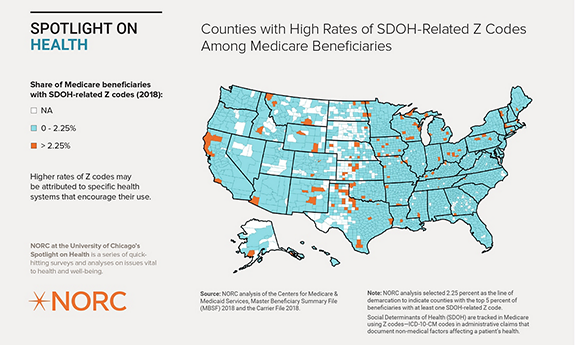Counties with High Rates of Social Determinants of Health-Related Z Codes Among Medicare Beneficiaries

September 2021
This Spotlight on Health explores the share of Medicare beneficiaries with social determinants of health-related Z codes in 2018.
Only 1.3 percent of Medicare beneficiaries, or about 724,000 people, had their social needs tracked in their 2018 health care claims, according to recent research from NORC.
Social determinants of health (SDOH) are non-medical conditions—such as housing, food security, and air quality—that affect peoples’ overall health. According to the World Health Organization, SDOH account for up to 55 percent of a person’s health outcomes.
Medicare tracks SDOH using ICD-10-CM “Z codes” in reimbursement claims. Z codes document non-medical factors affecting a patient’s health. However, providers are not reimbursed for such claims, creating a barrier to uptake. Experts and policymakers recommend expanding the use of Z codes, including implementing policies that reimburse providers for using Z codes, to ensure that patients’ social needs are tracked and met. The use of Z codes is not distributed evenly across the country. Instead, their use is concentrated in select counties and particular health systems, such as areas with large health care systems near Boston and the San Francisco Bay area.
The data used in this visualization were part of a larger survey conducted by The Associated Press-NORC Center for Public Affairs Research, with funding from The Associated Press and NORC.

This visualization was created by NORC’s VizStudio, a creative community of experts who turn complex data into compelling visual stories.


